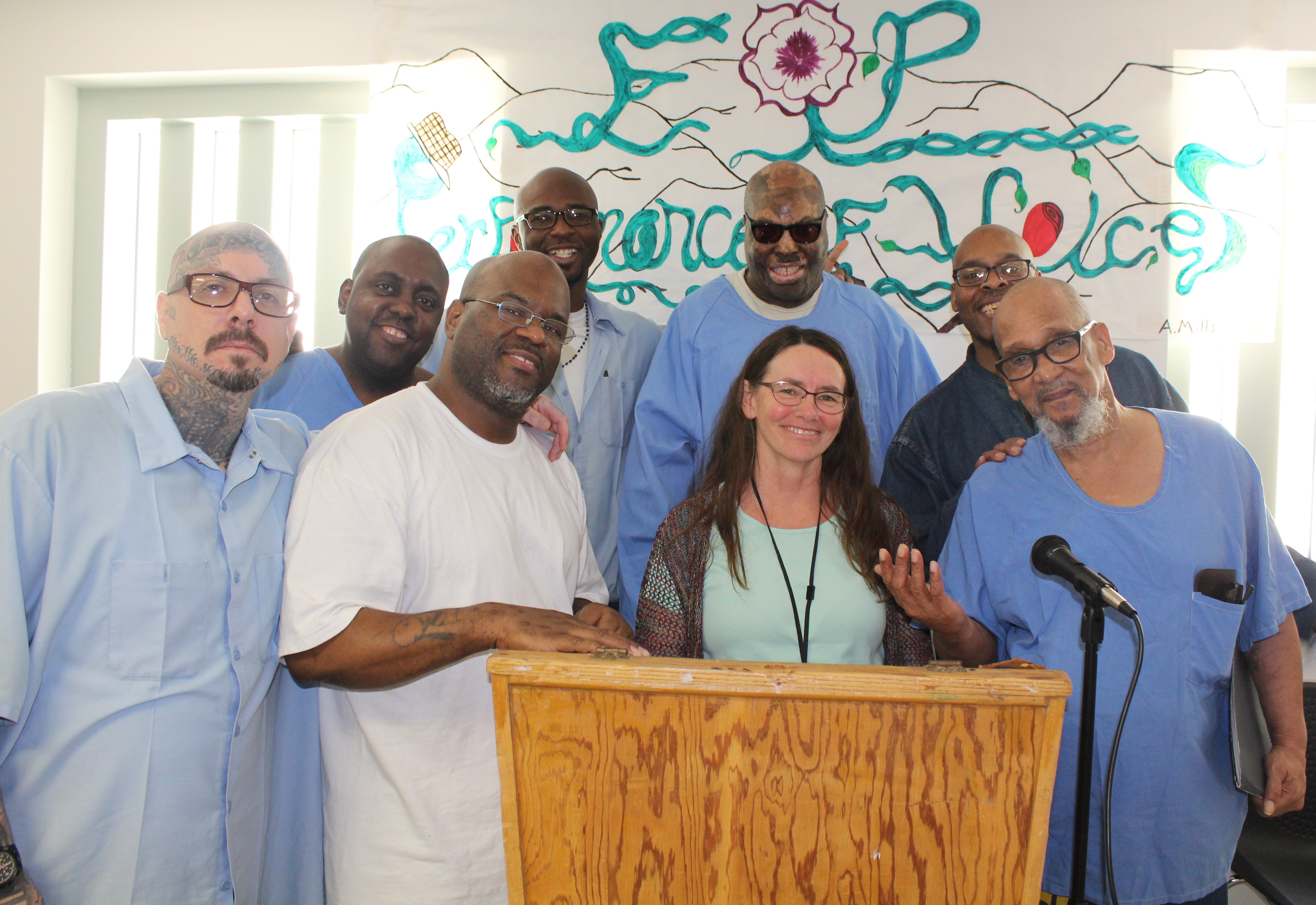CMF residents write poetry because words carry weight
Incarcerated residents at California Medical Facility (CMF) showed their appreciation to the mental health team with a poetry reading.
“You have all decided to work here, in this setting, with these people, in this situation – what were you thinking?” ribbed Carla Hunt, a recreational therapist at the Vacaville prison. She was addressing a crowd of physicians, therapists and administrators assembled for “Voices,” a first-of-its-kind poetry event at the institution. “It’s difficult work. It’s challenging work. And it is profoundly important work that we do here, to bear witness while people find their way in life.”
Clifton Freeman, one of the CMF residents and talented poet, set aside his nerves to read a statement from the group before sharing his original poetry.
“The reason we call our performing group Voices is because we want to be the voice of so many mentally ill people who are always misunderstood and feared,” he said. “We are seen as being other than human, or so-called normal. Calling ourselves Voices was a powerful way for us to express ourselves and to reach others. We hope others can find their own voice without fear of misunderstanding.”
Experiences shape poetry
Each Friday, the small group of men gathers inside CMF’s Enhanced Outpatient Program (EOP) facility. Under Hunt’s guidance, they pen works of poetry using vibrant imagery and keen word choices. Flowing underneath it all are real experiences that have shaped the author.
“This gives us an opportunity to let out our inner thoughts,” shared Carl Perryman. “Things from the past, and present, to be able to gaze upon ourselves and see what experiences we went through in life. It also gives us an opportunity to connect with brothers who are having the same thoughts, feelings that we do.”
“When we come to this group, we see a different side of everybody,” reflected Bruce Williams. “I watch the masks come off, defenses go down. (We drop) the armor we wear outside of the class in order to deal with the prison situation.”
Though general recreation has long been offered, Hunt said Voices was one of the first new, structured recreational therapy groups to open at CMF. Hunt thanked the administration and staff for their support, resulting in many new, goal-centered recreational therapy groups.
Recreational therapy offers rehabilitative goals
While general recreation is important, recreational therapy goes much deeper by allowing a professional to assess a person’s needs. Then, using a creative activity such as writing, addresses treatment goals.
“What they are really doing is putting words to what their life has brought them so far, while trying to make some sense of it,” she explained. “They’re trying to come to terms with their life, with their band of brothers here who have their back. It’s kind of a rare, precious thing that happens in prison, this kind of trust. Really it’s an honor for me to be part of it.”
The men of Voices are quick to give credit to Hunt for supporting and encouraging them to write, and for providing a safe space in which to go outside their comfort zones in a positive way.
“Writing has brought us closer to ourselves and each other, and in that company we have been able to start a healing process that has made us better men,” said Ahkin Mills.
Writing poetry helps to focus his energy in a positive way while also inspiring others to do the same.
Learning to re-focus efforts
Marlon Walkwek is also inspiring others through poetry, fostering a positive atmosphere, even inside prison walls.
“I write because I like to reflect lives in a positive way,” he said. “I’ve had to overcome the negative. I’ve faced a little adversity, but it’s inspiring. I had to get back to being myself. And I’m finding myself now, trying to let others live through me and just say what I feel. It is instrumental to change.”
“To me, it’s an escape,” said Michael Shannon. “It allows me to deal with feelings that I otherwise wouldn’t be able to deal with. Instead of just holding them in, I express them, and it gives me relief.”
Voices members each shared the reasons they write poetry, and the healing they found at CMF. To a man, the poets shared how their prison experience is compounded by the fact that they are in EOP. Even so, Voices helps them connect with one another, and themselves, reminding them they are still people.
Words offer inspiration
“After 25 years in prison, language has become my wellspring of inspiration and energy,” said Paul Adams. “When I delve into that world, it helps me get in touch with that humanness that I crave.”
As the reading wrapped up, audience members thanked the poets for sharing their words during the event. They also commended them on being brave enough to put pen to paper each week, sharing part of themselves. Hunt said her role is not to dictate what resident write, but to offer encouragement to thrive.
“I always tell them, the prompt is if you need a little something to inspire you. Don’t feel confined by the prompt,” she said. “The important thing is to find what is in you, put it on paper, and bring it to the group.”
“And then they read it out loud,” she added. “And they have somehow created a little bit of magic on Friday mornings.”
Story by Krissi Khokhobashvili
Read more rehabilitation stories.
Follow CDCR on YouTube, Facebook, X (formerly Twitter). Listen to the CDCR Unlocked podcast.
